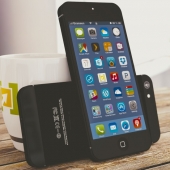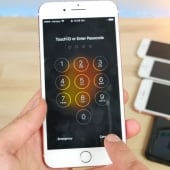-
New macOS Patcher Ransomware Locks Data for Good, No Way to Recover Your Files
A newly discovered ransomware family calling itself Patcher is targeting macOS users, but according to security researchers from ESET, who discovered the ransomware last week, Patcher bungles the encryption process and leaves affected users with no way of recovering their files.
- February 22, 2017
- 07:25 PM
 0
0
-
Macro Malware Hits Mac Users
After hounding Windows users for well over two decades, macro malware has taken its first steps towards affecting the other operating system on which the Microsoft Office suite is available, and that's Apple's macOS.
- February 10, 2017
- 12:27 PM
 0
0
-
Apple iCloud Kept Deleted Browser History Around for Over a Year
Apple appears to have been keeping deleted browser history in users' iCloud accounts, for as long as a year, according to Vladimir Katalov, CEO of ElcomSoft, a company that makes forensics and data recovery tools for Apple products.
- February 10, 2017
- 04:15 AM
 0
0
-
76 Popular iOS Apps Vulnerable to Silent Interception of TLS-Encrypted Data
Experts from Sudo Security Group have discovered that at least 76 of the most popular iOS apps available through Apple's App Store have failed to properly implement TLS encryption and expose their users to silent MitM (Man-in-the-Middle) attacks.
- February 07, 2017
- 10:30 AM
 0
0
-
Apple Takes Down iCloud Activation Lock Page After Disclosure of Security Flaw
Following the public disclosure of a security flaw in the iCloud Activation Lock web page that allowed phone thieves to reactivate devices to other Apple user accounts, the company has decided to shut down the page for the time being.
- January 31, 2017
- 08:27 AM
 0
0
-
Ancient Mac Malware Found Used in Recent Attacks, Can Work on Linux Too
Apple has recently patched macOS against possible attacks from a backdoor trojan discovered by Malwarebytes, which Apple engineers call Fruitfly, and Malwarebytes detects as OSX.Backdoor.Quimitchin.
- January 19, 2017
- 08:35 AM
 0
0
-
Two Emojis Can Crash Any iPhone and iPad
YouTube star EverythingApplePro has published a video today revealing two new methods through which someone could crash iOS devices.
- January 18, 2017
- 07:35 PM
 1
1
-
Tech Support Scam Causes Macs to Freeze
A new type of tech support scam tactic observed against Mac users relies on opening a large number of email drafts, an action which eventually causes the user's machine to become unresponsive.
- January 06, 2017
- 01:00 AM
 0
0
-
iPhone Chipmaker Foxconn Set to Replace Most Human Workers with Robots
Foxconn, the Chinese hardware manufacturer that builds chips for Apple's iPhone and iPad devices, is currently overhauling its entire factories and replacing most of its workforce with robots.
- December 31, 2016
- 06:16 AM
 4
4
-
Apple Gets Lazy on Encryption, Extends HTTPS Enforcement Deadline for iOS Apps Indefinitely
After announcing earlier this year plans to force all iOS app developers to deploy HTTPS starting with 2017, Apple postponed its deadline indefinetly, to give app makers more time to migrate their app and backend infrastructures.
- December 23, 2016
- 01:52 PM
 0
0
-
Russian Investigators to Attempt to Crack iPhone Belonging to Ambassador's Killer
Russian investigative experts sent to Turkey to help with the investigation into the assassination of Andrey Karlov, the Russian Ambassador to Turkey, are attempting to crack the killer's iPhone, but doing it without asking Apple for help.
- December 23, 2016
- 03:56 AM
 0
0
-
$300 Device Can Steal Mac FileVault2 Passwords
Swedish hardware hacker Ulf Frisk has published today instructions on how to build and use a $300 device that can retrieve login passwords for Macs protected by Apple's FileVault2 disk encryption system.
- December 15, 2016
- 05:35 PM
 1
1
-
Old Skype for Mac API Doubles as a Backdoor
A soon-to-be-deprecated API included with Skype for Mac contains a vulnerability that allows an attacker to bypass authentication procedures and query for user data or interact with a local Skype installation.
- December 13, 2016
- 02:20 PM
 1
1
-
Researchers Bypass Apple's Activation Lock on iPhones and iPads
Two researchers have found a way to bypass the Apple Activation Lock on both iPhones and iPads, running the two most recent versions of iOS, 10.1 and 10.1.1.
- December 02, 2016
- 06:25 PM
 0
0
-
Apple Users Bombarded by iCloud Calendar Spam
Over the past few weeks, Apple users have been bombarded with spam via a new method, with spammers leveraging Calendar event invitations.
- December 01, 2016
- 01:35 PM
 0
0
-
VK.com Video Link Can Crash iPhones in Seconds
A link pointing to a video hosted on the VK.com Russian social network can crash almost all iPhones running iOS versions as early as v7.
- November 22, 2016
- 05:05 AM
 1
1
-
Apple wants You to Open Your Heart to Everyone
At a time when there is so much divisiveness in the world, Apple has released a new video ad called "Frankie's Holiday" with a description of "An unexpected holiday visitor finally receives the warm welcome he's always yearned for.".
- November 21, 2016
- 03:25 PM
 1
1
-
iPhones Send Call History to Apple If You've Connected Your iCloud Account
Your iPhone is sending a history of all your calls to Apple's iCloud service, Oleg Afonin, Elcomsoft researcher has revealed today. For some iPhone users, this wasn't a secret. Many have figured it out on their own. This is especially true for family members that share an iCloud account on different iPhones.
- November 17, 2016
- 01:30 PM
 0
0
-
Mozilla Launches Firefox Focus, a Standalone Private Browser for iOS
Mozilla announced today Firefox Focus, a browser for iOS devices that is a stripped-down browser frame that only supports private browsing and nothing more.
- November 17, 2016
- 10:50 AM
 0
0
-
iOS Bug Lets Attackers Bypass iPhone and iPad Passcodes Using Siri
The owners of two Apple-dedicated YouTube channels, EverythingApplePro and iDeviceHelp, have found a flaw in the iOS passcode device protection system that allows an attacker to access the device's data, such as photos and messages.
- November 17, 2016
- 08:00 AM
 1
1


























